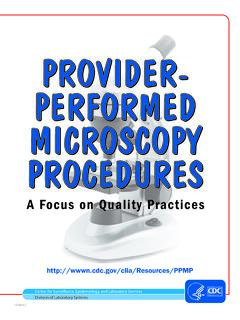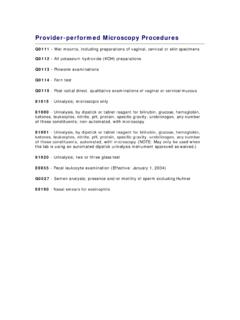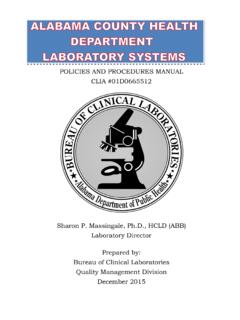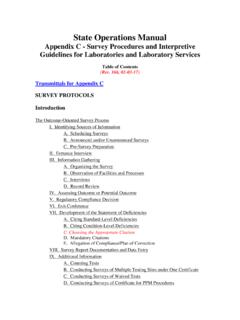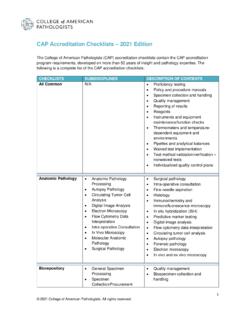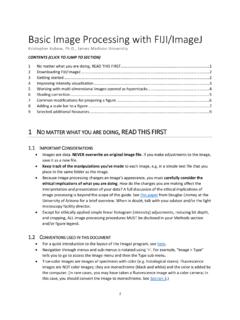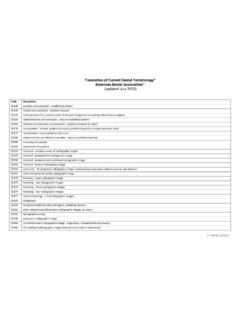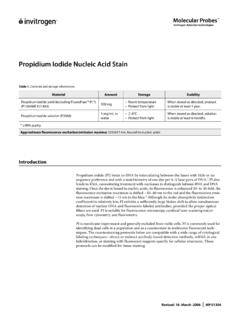Transcription of What Procedures are Performed by Primary Care Providers?
1 what Procedures are Performed by Primary care Providers? October 17, 2014 Richard W. Dehn, MPA, PA-C Bettie Coplan, MPAS, PA-C Roderick S. Hooker, MBA, PhD, PA-C Kristine A. Himmerick, MPAS, PhDc, PA-C Northern Arizona University PA Program Disclosures and Acknowledgements The investigators have no conflicts of interest that may have a direct bearing on the subject matter. The study has been deemed exempt by the Northern Arizona University Institutional Review Board. (IRB # 494741-1, Grant # 1002285) The study is generously funded by the PAEA Research Council grants program.
2 We acknowledge essential contributions by: Angelika C. Gruessner, MS, PhD University of Arizona College of Public Health Sean Clendaniel, MPH and Steve King North Country Health care Background--Workforce Primary care accounts for nearly half of all outpatient encounters. Physician assistants (PA), Advanced practice registered nurses (APRN), and physicians all contribute to the Primary care workforce. The full extent of Primary care activities undertaken by Primary care providers is largely unknown. (Dehn & Hooker, 1999) Background--Economic Some economists view PA, APRN, and physician roles as interchangeable in Primary care .
3 Others note differences exist in the types of visits and Procedures Performed by the three professions. (Everett et al., 2013) Background--Education The scope of training varies between PAs, APRNs, and physicians. Procedure training is expensive and time-intensive. Medical education programs need to know which procedural skills to include in training to prepare students for the job market they will encounter. The program curriculum must include instruction in technical skills and Procedures based on current professional practice. (ARC-PA Standards 4th ed) Background--Community Health Centers Community Health Centers employ PAs, APRNs, and physicians.
4 CHCs deliver a high percentage of procedural visits. Primary care PAs in rural Iowa were found to perform various Procedures , and procedural skills were perceived as important. (Asprey, 2006) Purpose of Study To assess the range and relative frequency of Procedures undertaken in Primary care by PAs, APRNs, and physicians. Procedures Evaluated Pulmonary Procedures Emergent Airway Management Thoracostomy Respirtory Procedures (Vital Capacity testing, Respiratory therapy, plethysmography, Gas Dilution, Airway Resistance Testing, Diffusing Capacity Testing) OB/GYN Procedures Fetal Monitoring Cervical Cancer Screening Physical Contraceptive Device Placement (Cervical Cap and IUD) microscopy (Urinalysis, KOH, Gram Stain, Wet Mount) Dermatology Procedures Dermatologic Procedures (acne surgery, biopsies, electrosurgery, cryosurgery, chemosurgery, surgical curettement)
5 Incision and Drainage Nail Excision Simple Wound Closure Complex Wound Closure Wound care GI Procedures Abdominal Paracentesis Hemoccult Naso- or Oro-gastric tube placement HEENT Procedures Cerumen Removal Ophthalmological Services Epistaxis Treatment Laryngoscopy Foreign Body Removal Cardiovascular Procedures Central Venous Catheterization Arterial Blood Gas Cardioversion Ultrasound Musculoskeletal Procedures Lumbar Puncture Joint Injection Splinting and Casting Bone Marrow Biopsy Urologic Procedure Pyeloplasty, Cystotomy, Bladder aspiration with suprapubic catheter, Urogram Low Complexity Procedures Venipuncture, Immunization, Injection, Electrocardiogram, Urinalysis, Pregnancy Test Methods Data source: 12 months of CPT codes (2012) from community health clinics in Northern Arizona.
6 Sample: Clinics 52 Unique Patients 59,674 Unique Visits 174,587 Unique Procedures 45,690 Total Providers 93 Physician 48 APRN 29 PA 16 Results 52% 50% 31% 30% 17% 20% 0% 50% 100% Total Providers Total Procedures PA APRN Physician Key Findings: Half of all providers are PAs & APRNs. Half of all Procedures are Performed by PAs & APRNs. 491 478 469 573 300 450 600 All Physician APRN PA Number of Procedures per provider Key Findings: All provider types perform Procedures . PAs perform more Procedures per provider than physicians or APRNs. Most Common Procedures by provider Type Rank Physician APRN PA 1 Fetal Monitoring* Respiratory Procedure* Respiratory Procedure* 2 Respiratory Procedure* microscopy Fetal Monitoring* 3 Joint Injection Fetal Monitoring* Dermatologic Procedure 4 microscopy Physical Contraception Cerumen Removal 5 Dermatologic Procedure Cerumen Removal Simple Wound Closure Key Findings: Respiratory Procedures and fetal monitoring are in the top 5 for all clinicians.
7 (*) OB/GYN Procedures are more common for APRNs than PAs and physicians. Dermatology Procedures are more common for PAs and physicians than APRNs. Conclusions PAs & APRNs are a substantial workforce for Northern Arizona CHCs, comprising half of the workforce and performing half of all Procedures . PAs perform more Procedures per provider than physicians or APRNs. Consistent with training, APRNs perform more women s health Procedures and physicians and PAs perform more dermatology Procedures . Conclusions for PA Educators Results add to the growing body of evidence that PAs, APRNs, and physicians may be fulfilling distinct roles in the Primary care setting.
8 These findings inform educators about which procedural skills to include in training to prepare students for the job market they will encounter. Future Directions Explore difference in Procedures by rural and urban location. Include more clinics across Arizona. Develop reproducible methods for evaluation of Procedures Performed in other states. References Dehn RW, Hooker, RS. Clinical Activity of Iowa Family Practice PAs. JAAPA Apr 1999, 12(4):63-77. Everett CE, Thorpe CT, Palta M, Carayon P, Gilchrist VJ, Smith MA. Division of Primary care Services Between Physicians, Physician Assistants, and Nurse Practitioners for Older Patients With Diabetes, Medical care Research and Review, Oct 2013, 70:531-541.
9 Asprey DP. Clinical skills utilized by physician assistants in rural Primary care settings. JPAE. 2006; 17(2): 45-47. Discussion For questions, comments, or concerns please contact.
